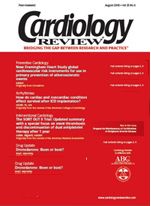Publication
Article
Aspirin dose less than 100 mg associated with lowest risk of bleeding
Cardiovascular disease
Stockholm—A meta-analysis revealed that an aspirin dose of less than 100 mg/day is associated with a lower risk of bleeding complications compared with higher doses, said investigators at the 2005 Congress of the European Society of Cardiology.
Victor L. Serebruany, MD, president, HeartDrug Research Laboratories, and assistant professor of medicine, Johns Hopkins University, Baltimore, presented data from a review of 31 clinical trials of 192,036 patients who were taking aspirin for secondary prevention of cardiovascular disease. Only studies in which patients had clinical follow-up for at least 1 month and in which a detailed description of hemorrhagic complications was reported were included in the analysis.
“Aspirin has been a mainstay of therapy to prevent acute myocardial in-
farction and secondary stroke, and at least 30 million people worldwide take aspirin for these indications,” said Dr. Serebruany, lead investigator of the study. “However, most reports have focused on efficacy and clinical outcomes after aspirin use, and few studies have linked the dose of aspirin monotherapy with the incidence of bleeding events. We conducted this analysis in order to provide physicians with needed information that may help them to better determine appropriate doses of aspirin therapy for their patients.”
The analysis compared the risk of bleeding for patients who took low- (< 100 mg), moderate- (100 to 200 mg), and high-dose aspirin (> 200 mg). Bleeding complications were classified into six categories—minor, major, gastrointestinal, stroke, fatal/life-threatening, or total.
Patients who were taking the lowest dose of aspirin had the lowest average rate for total bleeding events, 3.26%, versus 11.31% for moderate-dose aspirin and 9.40% for high-dose aspirin. The findings hold special importance for groups of patients at highest risk of bleeding complications, such as the elderly, smokers, alcoholics, and hypertensive patients being treated with angiotensin receptor blockers, which are known to inhibit platelets, said Dr. Serebruany.
The data provide confirmation of a dose-dependent relationship between aspirin and increased risk of bleeding complications, said coinvestigator Steven R. Steinhubl, MD, director of cardiovascular research and education, University of Kentucky, Lexington. “Based on the results of this and other analyses, it would be prudent for physicians and patients to consider a lower-dose aspirin as a preventive therapy,” he said. “I recommend that to get the cardioprotective effects of aspirin with the lowest bleeding risk, patients [should] take less than 100 mg day,” said Dr. Steinhubl. “More specifically, the only dose available below 100 mg in the US is 81 mg, so that’s what I recommend.”
In describing the prevalence and severity of bleeding with aspirin and other nonsteroidal anti-inflammatory drugs (NSAIDs), he said that the number of people who die of NSAID-induced gastrointestinal bleeding yearly is similar to the number of people who die from AIDS. “The mere fact that so many people take aspirin means that it has a potential for a lot of side effects,” said Dr. Steinhubl. “So while the individual risk of a person having a side effect is low, a low risk percentage-wise can amount to a lot of people when you have 30 million people taking it.”
